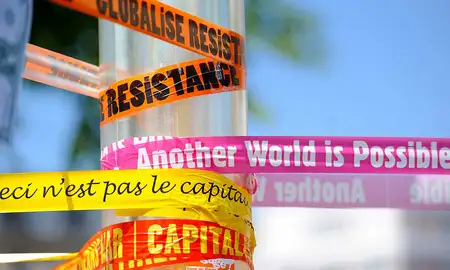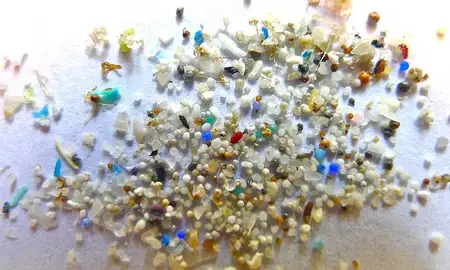
Dr Sy Taffel from the School of Humanities, Media and Creative Communication.
It’s a problem Dr Taffel believes needs to be addressed in ways that create a more equitable future for the world.
“People talk about saving the planet. The planet doesn't need saving. The planet has had multiple mass extinction events in the billions of years that there has been life here. What we need to safeguard is human flourishing, and that is quite different," he says.
Dr Taffel is a Senior Lecturer in Media Studies and co-director of Massey’s Political Ecology Research Centre. He has written extensively on the ways in which digital technologies impact on people and ecosystems.
His most recent work, co-authored with Deakin University’s Drs Laura Bedford and Monique Mann, Ecocide isn’t Ethical: Political Ecology and Capitalist AI Ethics, was published last year in Economies of Virtue: The Circulation of Ethics in AI.
Dr Taffel enumerates the harmful effects of digital technologies on both end users and those whose labour or lives are affected by the ancillary global supply chain and the vast amounts of waste it produces.
He starts with energy consumption.
“We tend to have a very poor grasp of the way AI functions. Look at the cost of hardware. It’s different from consumer devices like smart phones and laptops, where 80 per cent of the life cycle energy costs come from making it in the first place.
“Server hardware isn’t portable, it runs on mains electricity 24/7. And when we're talking about modern hyper-scale data centres, it tends to be enormous volumes of more powerful, more complex stuff, which is also more environmentally costly to produce in the first place.
“Then there's the environmental costs of the facility itself and the equipment needed to cool the servers. It's estimated that in the United States alone about 625 billion litres of water is used each year to cool data centres.”
Next up are the human and environmental costs associated with the production of micro electronics, such as mining ‘conflict minerals’ - tin, tantalum, tungsten and gold – in the politically unstable Democratic Republic of Congo, where child labour is also commonly used to mine cobalt.
Dr Taffel says rare earth elements are mainly mined and refined in China.
“These tend to be entangled with radioactive elements and so the waste tends to be really quite toxic and has produced a number of what are called cancer villages in China.
“Then there are all the energy costs associated with refining those materials. What you dig out of the ground is nothing like the incredibly purified substances that find their way into high performance micro electronics.”
The trade in these substances falls into what ecological economists and political ecologists describe as ecologically unequal exchange. Every year low-income nations send over 10 billion tonnes of raw materials to high-income nations who trade back things much further up the supply chain.
Dr Taffel notes that the focus of the emerging field of AI ethics has been more on issues of how to stop machine learning systems from being racist or sexist.
“Machine learning algorithms inadvertently learn to discriminate based on an insufficiently large data set,” Dr Taffel says.
“Hence the rhetoric of ‘what we just need is bigger and bigger data sets, because then they will be a bit more diverse’. And while that's been the case, bigger and bigger data sets also mean bigger and bigger environmental costs.
“It also doesn’t solve the problems with racism and sexism being part of datasets drawn from a world where those things are unfortunately common.”
Dr Taffel says he has little time for the environmental solutions offered by the big technology companies like Google, citing a recent study that suggested about 90 per cent of carbon credits are environmentally worthless.
“And then, alongside claims around efficiency and carbon credits, is also a kind of technological solutionism that says ‘It's okay. We'll design ways of sucking carbon out of the atmosphere in future’.
“People have been trying to do carbon capture and storage for well over a decade now. Basically it just doesn't work at scale at the moment.
“That kind of solutionist rhetoric effectively becomes a way of saying to people today, ‘Don't worry about the problem. We'll sort it out in the future, but we don't know how’. When we're talking about ecological crises that are likely to have catastrophic consequences for billions of people, we really don't think that's good enough.”
So what is the solution to the environmental and social costs of the digital technologies that are so important to us all today? And how can poorer countries have more equitable access to digital technologies without exacerbating existing problems?
As well as putting more effort into recycling electronic waste, Dr Taffel says he would start by rethinking those applications of digital technology such as crypto currencies that, in his view, provide little social value but absorb vast amounts of resources.
“Bitcoin uses as much energy each year as a medium sized European nation,” he says.
“Similarly with ultra high definition 8k video. Streaming video is already about 80 per cent of the data traffic that we have on the Internet. And 8k really doesn't give much of a benefit to end users unless your eyes are only a few inches away from the screen.
“So there needs to be a bit of thought into rebalancing priorities.”
Related news
Culture and capitalism – what’s going on?
Cultural studies experts are gathering in Wellington to share ideas at a conference about capitalism's impact on contemporary life and forms of expression.

Plastic plague – polluting land, sea and our bodies
An online conference examining the social and environmental impact of mega-tonnes of plastic waste infiltrating land, oceans and our bodies is setting a clean example with its "nearly carbon neutral" format.
